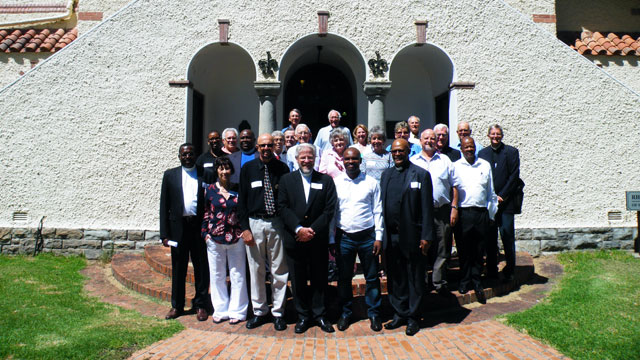
Saturday the 21st of January saw a group of approximately 25 people gather on the lawns in front of the Environmental Science Department. Many of them had known the spot as a meeting place for students from the former Department of Divinity, which had previously occupied those buildings.
The group, which included attendees from Johannesburg and even further afield, were there to celebrate the contribution made by both the former theology department at Rhodes, which was open from 1947 to 2000, and the Federal Theological Seminary of Southern Africa (Fedsem) in Alice, functional between 1963 and 1993, to churches in South Africa over the years.
The event, which had the theme of “Remember, Rejoice and Renew” and was repeated in Alice the following day, fell under the auspices of the Church Unity Commission and was given full support by Vice-Chancellor, Dr Sizwe Mabizela.
Bishop Paul Verryn of the Central Methodist Church, an alumnus of the ecumenical Department of Divinity, opened proceedings with prayer before leading a discussion with Reverend Donald Cragg, a senior graduate, in the Rhodes Chapel.
With the intention of bringing closure to the pain caused in the ending of the cooperation between the Department of Divinity, Fedsem and the churches, and envisioning possible ways forward together, the group sought to answer two questions: what had been lost, and how that could be regained.
Bishop Verryn said that much more pain surfaced than he had expected. “We’ve knocked on a door that has been closed for a very long time,” he said. “Sometimes we don’t realise the huge effect that bureaucratic decisions have on people’s lives.”
The speakers, who included Reverend Cragg, Minister Glen Craig from Kenton-on-Sea (also an alumnus of the Department of Divinity), itinerant preacher Larry Kaufmann from Howick, and Emeritus Professor of Contemporary Spirituality from the Department, Felicity Edwards, shared their positive experiences of the Department, as well as the challenges they had faced.
“There was a great deal of sadness about the Department closing down, especially among the final batch of students, whose morale was impacted,” said Professor Edwards.
It emerged that the reasons for the closure of the Department were varied, but primarily included finances and a concern that what was being taught was becoming irrelevant, particularly in the face of shifting academic focus from Humanities subjects to Science and Commerce.
The participants discussed a need for the re-creation of departments like the Department of Divinity at universities in South Africa, as well as a need to “break down the silos” between churches. There was a call to deal with the pain caused in the past, and be committed to creating a common space to strengthen theological education in the country.
“We need to meet each other ecumenically to move forward,” said Reverend Lungile Mpetsheni, Secretary-General of the Uniting Presbyterian Church in Southern Africa.
Bishop Verryn said that creative suggestions, insights and contradictions had emerged from the talks, and committed himself to engaging with authorities to look at ways of re-establishing a Department of Divinity in some way.
“A university needs to have a Department of Theology or Religious Studies – call it what you may – a place where the profound issues of human existence are scrutinised, debated and understood,” said Verryn, echoing the sentiment of Fedsem alumnus Professor Itumeleng Mosala during the talks. “That place is critical in building an ethical core and conscience in society, and creating a narrative of hope.”
The discussion was followed by a special service at the chapel, with Professor Itumeleng Mosala serving as the preacher and the liturgy designed by Canon John Suggit. Another event will be held in Pietermaritzburg on the 18th of February.
